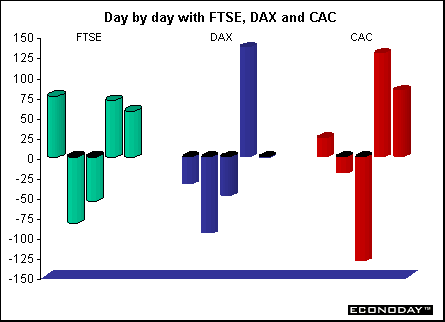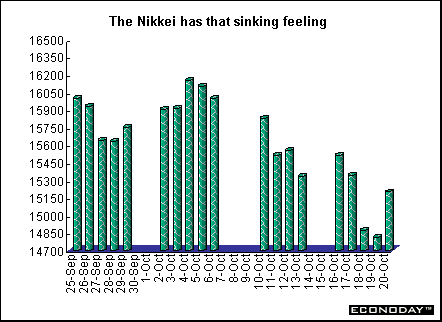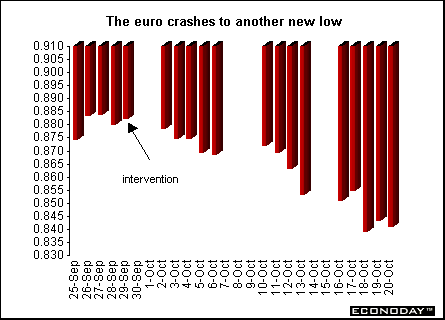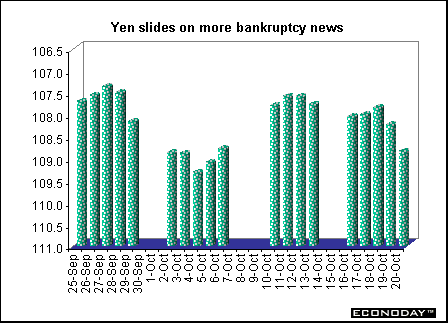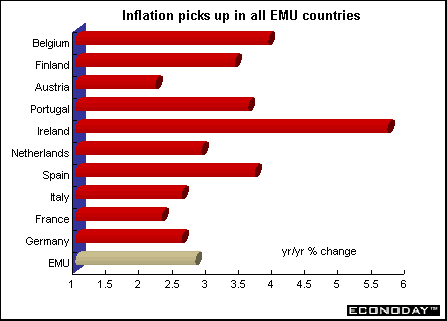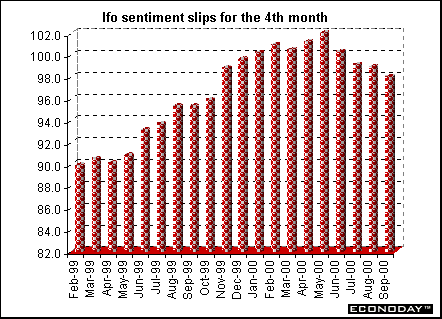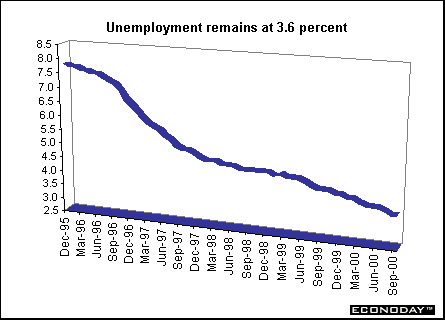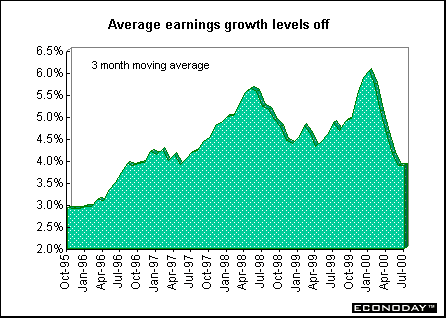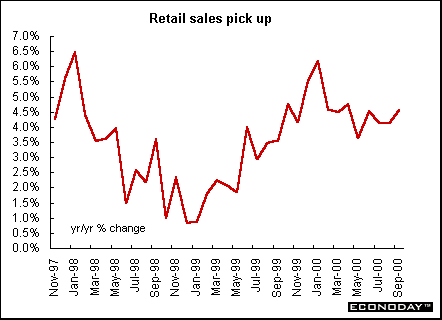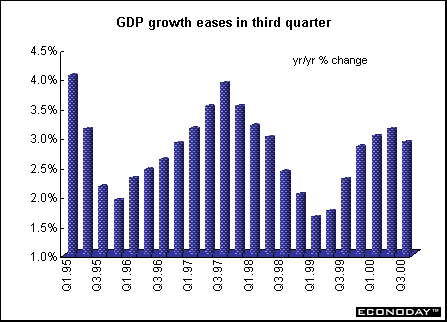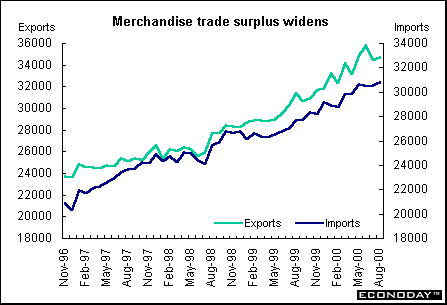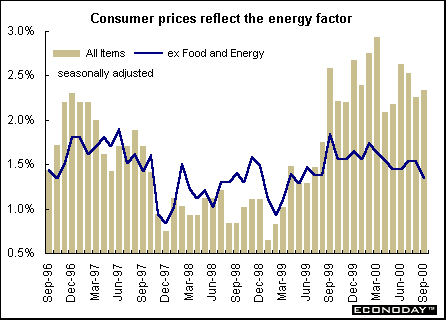| Previous Articles |
|
Volatility rules world equities markets The foreign exchange markets continued to fret over and punish the euro. The European Central Bank left their policy making interest rate at 4.75 percent Thursday, as expected. The ECB last raised rates on October 5 by 25 basis points. But the markets' focus was more on the press conference that followed the Paris meeting. The euro continues to slip to new life time lows, greased by prior intervention comments by ECB president Wim Duisenberg. (See currencies below.) It was a much subdued Duisenberg that responded to questions on Thursday.
Britain and Europe
Wednesday's dramatic drop - and partial recovery - on the Dow and Nasdaq moved across the ocean like lightning. A slightly higher than expected U.S. consumer price index raised the specter of higher interest rates - adding to the market troubles. However, Thursday was another day. The markets rallied on good earnings news and liked the feeling so much, they continued to rally on Friday. At week's end, although it was hard to believe, the FTSE 100 ended up 66.70 points or 1.07 percent at 6276.30. The FTSE was helped by good economic news, namely that unemployment remains low, average earnings growth is subdued and preliminary gross domestic product growth eased slightly. (See indicator scoreboard below.) The minutes of the last Bank of England Monetary Policy Committee meeting, revealing that all members voted to leave interest rates unchanged, also buoyed market spirits. In Europe, many of the same issues addled investors. Worries about earnings and perhaps slowing economic growth contributed to their unease. While the Paris CAC managed to close ahead on the week - up 85.23 points or 1.41 percent to 6149.44 - the Frankfurt DAX did not. It slipped 42.87 points or 0.64 percent to end at 6618.43. Asia
Currencies
Traders, often a superstitious bunch, had speculated that the month anniversary of the concerted intervention on September 22 could see another round of action to support the euro -- but it didn't happen. Adding to the euro's woes were concerns that the cease-fire in the Middle East was crumbling as fresh news of gun battles hit the wires. Traders continue to fret over the impact of rising oil prices, often a consequence of the tensions, on the European economy. The combination of high crude oil prices, which are priced in dollars, and the ever sinking euro is an inflation worry. It seems as though each week we add to the list of major bankruptcies - and it seems as though it is always the largest one yet. The yen fell against most major currencies after Kyoei Life Insurance Co. said it would file for court protection from its creditors, fueling concern Japan's economic recovery will suffer from more corporate failures. Kyoei, Japan's 11th-largest life insurer, marks Japan's biggest corporate collapse in 50 years, and is the second large insurer to fail this month. Kyoei's collapse follows a similar filing this month by Chiyoda Life Insurance Co. The problems of both companies have been known for some time, and were not a surprise. Investors are worried, however, that the problems in the insurance industry when added to banking sector woes are jeopardizing the country's still fragile economic recovery.
Indicator Scoreboard
Germany - September Ifo Institute's west German business sentiment index fell to 98.0. It is the fourth consecutive month that the index has slipped, pushing it the lowest level since October 1999. The decline came from both weaker future expectations by west German businesses, down to 103.0 from 103.8 in August, and a drop in sentiment on current business conditions, down to 93.2 from 94.2 in August. East German business sentiment dropped sharply to 103.8 from 105.7 in August. Current conditions fell to 122.4 from 123.8 while business expectations sank to 86.2 from 88.7.
August manufacturing orders were revised upward to 2 percent. West German orders rose 3 percent but east German orders fell 10.4 percent. Both domestic and foreign orders were revised up - domestic orders to 1.3 percent and foreign orders to 2.9 percent. August real seasonally adjusted pan-German industrial output was revised down to a 1.0 percent increase from the 1.1 percent originally reported. Manufacturing output rose an unrevised 1.2 percent mainly due to the strong capital goods sector, which was up 4.1 percent. Durable goods rose 0.4 percent while intermediate goods production remained flat on the month. Consumer goods production fell 0.3 percent. West Germany output rose a revised 1.2 percent and east German output was revised to down 1.4 percent. September wholesale prices rose 1.7 percent and 6.9 percent when compared with last year. The annual wholesale price gain, which was due to higher oil prices, was the largest in 18 years (June 1982) and the largest monthly jump since January 1989. Excluding fuel prices, wholesale prices were unchanged on the month, but the annual rate edged up to 3.2 percent from 3.1 percent in August. September petroleum product prices jumped 15.4 percent, led by a 26.1 percent surge in heating oil costs. August real seasonally adjusted construction orders fell 4.7 percent and were down 14.4 percent when compared with last year. West German orders were down 7.4 percent and 15.9 percent on the year. However, August east German orders rose 3.1 percent but fell 10.2 percent when compared with last year. France - July/August manufacturing output bounced back 1.8 percent. All manufacturing sectors recovered. July and August are presented as a single reporting period, assuming flat output in August because of the traditional summer holiday season. Gains were led by the auto industry, up 2.6 percent, semi-finished goods, up 2.3 percent and consumer goods, up 1.6 percent. Italy - August seasonally and work day adjusted industrial production climbed 1.2 percent and 7.9 percent when compared with last year. Britain - August claimant count unemployment remained at 3.6 percent, the lowest since October 1975. Unemployment on the International Labor Organization measure in the three months to August fell by 100,000 on the previous three month period and was down 168,000 on the year. The ILO unemployment rate remained unchanged from the previous three months at 5.3 percent. The employment rate still stands at 74.7 percent. Manufacturing continued to shed jobs, losing 83,000 in the three months to August.
August annual average earnings rose 4.1 percent when compared with last year, up from 3.8 percent in June and July. For the three months to August, growth remained at 3.9 percent when compared with last year. Growth continued to be faster in private firms than in the public sector. The increase is below the Bank of England's target of 4.5 percent growth.
September seasonally adjusted retail sales volumes jumped 0.6 percent and were up 4.6 percent when compared with last year. Particularly notable were strong rises in the household goods and clothing and footwear components. These rose by 1.2 percent and 1.0 percent on the month, respectively.
Preliminary third quarter gross domestic product rose 0.7 percent and 2.9 percent when compared with last year. Service sector output slowed to a quarterly growth rate of 0.7 percent and an annual rate of 3.3 percent.
Asia September merchandise trade surplus fell 5.8 percent on the year while the surplus with the United States fell 0.5 percent. Exports rose 9.5 percent but were outpaced by imports, which gained 16.8 percent. Exports to the United States. were up 4.3 percent but imports rose 10.9 percent. August tertiary industry activity index, which measures service industries output, rose 1.1 percent after falling 1.3 percent in July. Americas August merchandise trade surplus rose to C$3,983.3 million, primarily because of higher shipments of passenger cars and aircraft as well as expanding energy exports. Exports rose one percent while imports went up 0.8 percent. Energy exports rose 2.6 percent entirely because of higher prices for crude petroleum, natural gas and electricity. August electricity exports were up 153.5 percent when compared with last year, largely because of demand from California. Exports to the United States jumped 15.8 percent while imports from the United States rose 8.3 percent. The trade balance with the United States was a positive C$56.9 billion, but the balance was negative with all other trading partners.
September seasonally adjusted consumer price index was up 0.5 percent and 2.34 percent when compared with last year. The underlying rate of inflation, the CPI excluding food and energy was up 0.1 percent on the month and 1.34 on the year. On an unadjusted basis, the September CPI rose 0.4 percent and 2.7 percent when compared with last year. Core CPI 0.2 percent and just 1.3 percent on the year. The Bank of Canada's inflation target range is one to three percent.
BOTTOM LINE Investors will be watching the equities markets closely and earnings with a magnifying glass to judge performance, perhaps neglecting the prudence of focusing on the longer term. Economic data continue to show vibrant growth in Europe and the Americas. This should reassure investors.
Release dates are subject
to change. |
|||||||||||||||||||||||||||||||||||||||||||||||||||||||||||||||||||||||||||||||||||||||||||||||||||||||||||||||||||||||||||||||||||||||||||||||||||||||||||||||||||||||||||||||||||||||||||||||||||||||||||||||||||||||||||||||||||||
